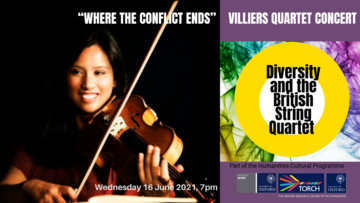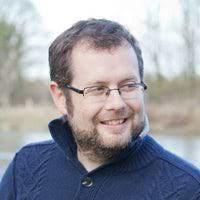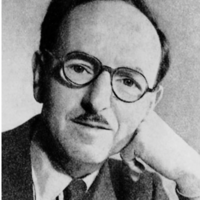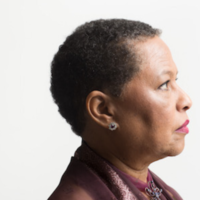“where the conflict ends” | Villiers Quartet Concert
Diversity and the British String Quartet Symposium Day 3

Part of the Humanities Cultural Programme, one of the founding stones for the
future Stephen A. Schwarzman Centre for the Humanities
Wednesday 16 June 2021, 7pm
https://www.youtube.com/embed/YtroybU0Mxc
Livestreamed concert live from the JdP Music Building
The Villiers give the premiere of two of their From Home Composers: Robert Fokkens's "Spinning, Weaving" and Jasmin Kent Rodgman’s “where the conflict ends” which expresses the difficulty of finding one’s voice. Matyas Seiber was a Hungarian-British emigre who studied with Kodály and was heavily influenced by Bartók; he also taught John Mayer in London. Eleanor Alberga’s vibrant String Quartet No. 2 closes the programme.
This event is part of the Diversity and British String Quartet Symposium. You can read more about the Diversity and the British String Quartet HCP project here.
Programme:
Robert Fokkens - *From Home world premiere
Matyas Seiber - String Quartet No. 3 ‘Quartetto Lirico’ (1948-1951)
Jasmin Kent Rodgman - where the conflict ends *From Home world premiere
Eleanor Alberga - String Quartet No. 2 (1994)
Villiers Quartet
Katie Stillman, violin I
Tamaki Higashi, violin II
Carmen Flores, viola
Leo Melvin, cello
Programme Note:

Robert Fokkens – Spinning, Weaving (2021)
From Home World Premiere
Robert Fokkens is a South African composer based in the UK. His work explores a range of influences from traditional South African music to 20th- and 21st-century experimental music, via jazz, electronic dance music and the classical canon, creating a music characterised by twisted cycles, rhythmic energy, and microtonal inflections. The Times has described his work as being “fascinating”, “imaginatively orchestrated” and having its “own engaging quirkiness”.

Matyas Seiber (1948 – 1951)
The composer Mátyás Seiber was born in Budapest in 1905. He learned instruments from an early age, and from the age of 14 he attended the Ferenc Liszt Consevatory where he studied Cello with Adolf Schiffer and studied composition with Zoltán Kodály.
In 1925 he took up a position as a cellist on a cruise ship in the Americas where he became acquainted with Jazz. Returning to Frankfurt, he became the director of the first Jazz department in a German conservatoire from 1928-33. His many successful works are characterised by ’fearless self assurance and a healthy disregard of genre limitations and national borders’ (AVI music), comprising ballets, comic operas, chamber music, and film scores.
The yearning opening phrase of Quartetto Lirico (1948-51), briefly reminiscent of Berg’s Op 3, initiates a work of expressiveness and passion, with a lighter scherzo (and fractious trio) for contrast. The pensive lento espressivo finale leaves us with a low, insistent two-note figure in the cello, Seiber’s own instrument, and comes to rest (like the first movement) on a calm major triad.

Jasmin Kent Rodgman - where the conflict ends
From Home world premiere
where the conflict ends is an expression of frustration. The rage and exhaustion of voicelessness.
The violence of being silenced. Of living in silence.
It is a meeting point of internal tensions between conflicting heritages. A proximity to whiteness and fragile privileges. Our bodies and voices, policed by those who could never understand what it's like to live in our skin. It is a statement left with no response.
The title, where the conflict ends, comes from a poem by the same name, by the extraordinary lisa luxx, from her recent chapbook Trust Your Outrage. The final line of the poem, in particular, resonates with me:
'In our bodies the world comes together...' - Jasmin Kent Rodgman

Eleanor Alberga - String Quartet No. 2 (1994)
Eleanor Alberga is a highly regarded mainstream British composer with commissions from the BBC Proms and the Royal Opera, Covent Garden. Her music is performed all over the world. Born 1949 in Kingston, Jamaica, Alberga decided at the age of five to be a concert pianist. Five years later she was composing works for the piano.
In 1968 she won the biennial Royal Schools of Music Scholarship for the West Indies which she took up in 1970 at the Royal Academy of Music in London, studying piano and singing. But a budding career as a solo pianist - she was one of 3 finalists in the International Piano Concerto Competition in Dudley, UK in 1974 - was augmented by composition with her arrival at The London Contemporary Dance Theatre in 1978. Under the inspirational leadership of Artistic Director Robert Cohan, she became one of the very few pianists with the deepest understanding of modern dance and her company class improvisations became the stuff of legend. These in turn led to works commissioned and conceived for dance from the company and Alberga later became the company’s Musical Director, conducting, composing and playing on LCDT’s many tours.
It was on leaving LCDT that Alberga was able fully to embark on the journey towards her calling as a composer. And since then interest in her music across all genres - orchestral, chamber, vocal and as well as works for stage and screen - has accelerated, while her output has continued to grow. By 2015 her commissioned work ‘Arise Athena!’ for the opening of the Last Night of the BBC Proms was seen and heard by millions and cemented a reputation as a composer of huge originality and consummate skill.
She has gathered a number of awards - notably a NESTA fellowship in 2000 and a Paul Hamlyn Award in 2019. In 2020 she was elected a Fellow of the Royal Academy of Music. At different times Alberga was a member of the African Dance Company Fontomfrom and played guitar and sang with the Jamaican Folk Singers. She was part of the duo Double Exposure with her husband the violinist Thomas Bowes and more recently they have together founded and nurtured Arcadia, an original festival in the English countryside where they live.
Eleanor Alberga’s second string quartet was commissioned by the Smith Quartet in 1994. Of the work, Eleanor writes “with this second quartet, it was what the listener will hear in the first two seconds that yielded all the raw material needed. This short motive is treated to all manner of variation - inversions, expansions and so on - and is present in some form or another throughout the 15 minutes of the entire work. I have embedded some elements of traditional forms such as scherzo and slow movement into a freely flowing single span that might allow this quartet to be described as being in a compressed sonata form.”
Named after Villiers Street in London, the Villiers Quartet encompasses the grand and iconic spirit of the extraordinary music tradition in Britain and has been praised for “exquisite ensemble playing” (Seen & Heard International), and their absolute “commitment and virtuosity” (The Sunday Times). The Villiers Quartet is the Quartet-in-Residence at the Jacqueline Du Pré Music Building at St. Hilda’s College, Oxford University.
Hailed as “Champions of British Music” (The Observer), the Villiers Quartet has become one of the most recognised quartets in the UK for the performance of British music, releasing acclaimed recordings of works by Elgar, Delius, Peter Racine Fricker, William Sterndale Bennett, David Matthews, William Alwyn and Kuljit Bhamra, MBE. In 2020 they gave the world premiere of the complete 1888 Delius string quartet, featuring movements in their original versions uncovered by Professor Daniel Grimley from Oxford University.
In 2020 the Villiers Quartet initiated new digitally-based projects including VQ Discovery: Beethoven Discovery, an online course to study Beethoven’s quartets in-depth whilst in lockdown; #VQCreate, mentoring secondary school students online to compose new music for string quartet; and From Home: VQ Commissions, commissioning new works from diverse British composers to celebrate the VQ’s 10th Anniversary season for 2021. These works will be premiered at the Oxford Symposium led by Dr. Joanna Bullivant and Prof. Samantha Dieckmann, “Diversity and the British String Quartet”.
The Villiers Quartet has been broadcast live on BBC Radio 3 from the Leamington International Quartet Series, and on NPO Radio 4 live from the Concertgebouw. The VQ has been featured on BBC’s In Tune and also BBC One’s The Andrew Marr Show with pianist Alexis Ffrench and double bassist Leon Bosch. The VQ was the featured quartet on the score to the BBC film Lady Chatterley’s Lover. The VQ presented masterclasses in the UK and abroad at Oxford University, Duke University, Dartmouth College, University of Nottingham, Syracuse University, Cal State LA, Jacksonville University, and Indiana University South Bend. ambassadors for British chamber music, the VQ has given premieres and performances of music by British composers including Anthony Payne, Alexander Goehr, Martyn Harry, David Matthews, and Elizabeth Kelly
The broad curiosity of the Villiers Quartet and its passion for teaching and performing have made the VQ a valuable resource for students and audiences alike. Inspiration comes from the heart of the Villiers Quartet’s philosophy: to believe in the art of string quartet.
This project has been generously supported by the Oxford Humanities Cultural Programme, Arts Council England, the RVW Trust, The David Willets Fund for Teaching Innovation, and supporters of the Villiers Quartet’s From Home Commissions Fund.
Find out more about the full Diversity and the British String Quartet Symposium programme here.


